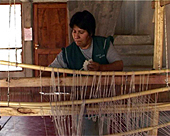"Portrays the group of women spinners and weavers in Santa Maria, Catamarca province, in the Northwestern region of Argentina. The weavers and the herders of the animals, llamas and vicuñas mostly, have established a tight network that collaborate and exchange information on topics of mutual interest. The cooperative functions as a space for women’s empowerment insulated from domestic violence that occurs frequently in this impoverished mountainous community. The film presents a constructive image of Tinku Kamayu women not as victims, but as those who resisted poverty with creative and productive work. The camera captures the breathtaking landscape of the Andes Mountains in Argentina and an Andean flute provides the background music, bringing to the viewer cultural elements that supplement the narratives of these courageous women."
- Kayo Denda, Educational Media Reviews Online (EMRO)
"This short film features a rural cooperative in Argentina, one example of a type of culture-based, spiritually-oriented, local development initiative. A tantalizing glimpse into alternative models of development to put alongside such ideas as microfinance. Suitable for high school and college courses in cultural anthropology, anthropology of development, anthropology of women, and South American studies, as well as general audiences."
- Jack David Eller, Anthropology Review Database
"Presenting alternatives to an individualist capitalist economy TINKU KAMAYU shows the value of cooperatives, the importance of community-based initiatives and indigenous knowledge, and the drawbacks of receiving funds from government programs and NGOs... Because of the way it complicates ideas about production and economic success, the film provides an opportunity to explore the meaning of ”development” by offering alternatives to orthodox understandings of development work."
- Verna St. Denis, Films for the Feminist Classroom
